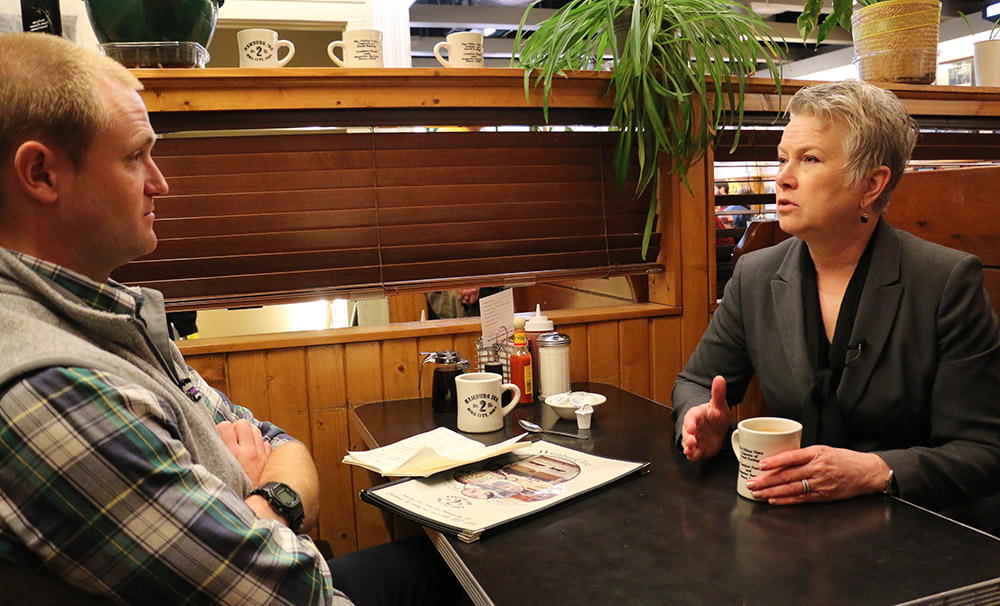
By Nate Kaeding
[email protected]
Ed. note: Sponsored by West Bank, this is the latest edition of the CBJ’s new Q&A feature with Nate Kaeding and notable Iowa business and cultural leaders, available first to CBJ members. Read more about the idea for the series here, and watch the Flow Media-produced video interview below or at the CBJ’s YouTube channel.
I always get a chuckle out of the old Dwight D. Eisenhower quote, “Plans are useless, but planning is indispensable.” Isn’t it true? In this “Age of Acceleration,” as Thomas Friedman has dubbed it, today’s well-laid plan can be derailed tomorrow by any number of forces. But the inevitability of change need not render the planning process pointless.
Sarah Gardial, the dean of the University of Iowa’s Tippie College of Business, arrived on campus during the spring of 2012 and has guided the college through two separate strategic planning processes during a time of turbulence in higher education. She’s earned the reputation of being an innovative leader and effective coalition builder – not always easy to do on a university campus – and made national news in 2017 for her decision to end Tippie’s full-time MBA program, a sign of her willingness to make hard choices necessitated by market demands.
Sarah and I sat down for a cup of coffee at the Hamburg Inn in Iowa City to talk about her approach to planning, how she manages change and why she has chosen a career in higher education.
Looking back on your career, was your path to dean a purposeful progression up the career ladder? Is this something you had planned?
No, it was more a combination of following my passion – which was, what’s the student experience and how can we make that better – but also looking around and seeing problems. And you either wait for someone to solve that or you jump in and say, “I’ll solve that.” I’m not good sitting around and waiting for other people to move, so pretty quickly I said, “I can fix that.” And once you do that, people just start giving you more and more things to work on. Your plate gets bigger all the time.
What attracted you to the opportunity here at Iowa?
People always ask me, “why here?” It was two things: One is, I think there has to be a very strong alignment of values with the people that I’m working with, because otherwise it’s just miserable. And coming here, I loved the people, I could see doing really good work … but the other thing is, I like to build and not to maintain. While I was interviewing at other schools, I stood up and said, “If you just want someone to keep the trains running … we will all be miserable.”
When I came here, in addition to finding people whose values were completely aligned and who I respected, the folks at the school said, “We feel really good about what we’re doing, but we also think there’s a little bit of treading water going on here, and we’re ready to kind of envision that next thing. We want someone to help us do that.” And I said, “That would be me.”
During your interview here, were there any questions that threw you off guard?
I will tell you the one question that you get asked, which I think is pretty crazy to ask early in the interview process – what’s your vision for our college? That would be pretty arrogant for me to walk in off the street and say, “I’ve spent a couple hours on the internet looking at you guys, and I’ve got the answer.” I would instead say, “I can’t answer that question, but here’s what I know. I know what’s going on nationally and internationally in business education, because I have been at the top of some leadership organizations … and I have spent a lot of time with deans, talking about what was rocking their world.” So I knew what the larger environment was demanding of business schools, and I said, “What we’ll do is come in here and craft the unique solution to the University of Iowa.”
So now, as you’re doing the hiring, what advice can you give to someone to prepare for a job interview?
I think two things are really important. I always look for a lot of enthusiasm for the job, and it seems crazy, but you don’t always get that. I literally want to see fire in the belly. We’re all running fast and hard and if you don’t have that, you’re just going to burn out.
I also look for someone who knows themselves. I’m almost more interested in someone who has confidence in who they are than necessarily knowing the job. There’s always a general skillset that you’re looking for, but a lot of that can be learned on the job. What you don’t want is someone who’s not really clear about who they are, what their values are, what they do well, what they don’t do well or how they work with other people.
What’s the origin story of the first strategic planning process you led here at Tippie?
I actually hit the ground here [at the UI] on Memorial Day weekend, and the faculty are kind of gone at that point. So I had a window where I could do what I call my “walking around tour.” I started calling on people up and down the halls of my college and on campus, and that was really an amazing time for me to just soak up everything and find out what I didn’t know. I would even ask people in the kind of jobs that I typically should understand – like, if I’m talking to the MBA program director, I’d say, “What do I not know about your program? What’s the one thing that would surprise me? Tell me the things that are unique.”
So a lot of listening, not much talking.
Right – I went in with about five questions and then I just listened. Then it started with revisiting everything from the vision and mission to what our strategic priorities are. I got a core group to work with me on that – I sent out an email to the college and said, “Send me your nominees for the most creative and respected people that you know in this building” – and I think both are important, right? Because you can be creative and not respected, or you can be respected and not particularly creative, but I wanted both.
To me, there’s an interesting dynamic when doing a strategic plan in the academic world. All the experts in that particular business field are putting together a strategic plan, but how do they take a step back and look at it? Everybody’s an expert.
Yeah, but here’s the good news – there is a lot of expertise around strategic planning [at Tippie]. Most of the faculty in leadership positions at universities don’t come from professional schools. So bringing people to the table who understood strategic planning and the value of it was the easy part. Finding the innovators was the more difficult piece. How do we bring people in who can see things differently than what we’ve been doing?
How forward reaching was the strategic plan?
We decided that we would revisit everything in five years, and so we just did that in the 2016-17 academic year. We had another group of faculty that went in and assessed, where are we with this plan? Where did we hit the mark? Where did we come up short? Where do we need to kind of reboot?
The world of higher education is constantly in flux. Talk a little bit about how you cope with the rapid changes that are happening today?
I’m a marketer by training, so I am automatically tuned to what’s going on, in terms of our customers – which in this case are students – but also the employers of our students. What’s going on with major macro trends that are hitting on globalization, technology, all of those things. I think my training is that you’re constantly reading those tea leaves. You’re not every five years going out and saying, “What’s happening today?” Because it is constantly changing, and your job is to be agile and respond to those changes.
So do you call that out specifically in a strategic plan?
Absolutely. You can get too locked in to what got you there – an MBA had kind of been our one-trick-pony. If you wanted something beyond the undergrad, we’d throw the MBA at you. Well, now people are wanting that MBA, but in different formats. Some people want less than the MBA and some people want something after the MBA, so just having this one product that we played out in multiple formats was not fitting the bill. And the proof is in the pudding; since we started rolling out non-degree certificate programs and specialty masters programs, the demand for those was instant. That’s the trick – being able to follow the demand because demand is changing.
I’ve always been fascinated by folks like yourself who seem to squeeze a million things into a day. How do you approach daily planning in regards to prioritizing your time?
Oh my gosh … I’m not sure I’m the poster child for this. Let me just say, I don’t think I handle this gracefully all the time. I’ve got a whole lot of constituents that I need to serve, from the faculty and students to the employers and alums.
I honestly brought my assistant in at the end of last year and said, “We have to do a better job of prioritizing.” So we literally started creating categories of “must do” versus “nice to do” versus “I don’t have time to do.” And I hate that last bucket, because the stuff in there is stuff I’d love to do. But we literally had to lay out some prioritization to help get control of things.
Rapid Fire Questions:
What profession other than your own would you most like to attempt?
Archaeologist. I love the way they put the puzzle together.
Favorite business leader of all time?
Oprah. I think most people look at her as more of an entertainer, but the thing is, her business play just personifies her values.
Your preferred daily news source?
New York Times online.
Favorite motivational quote?
It’s from a Pogo cartoon: “We are surrounded by insurmountable opportunity.” The key is the absurdity of it. The opportunities are what surround us, and we’ve got to get on with it.
If you had 30 extra minutes in the day:
I would pile the minutes up and get a whole bunch of really cool people around my table. My favorite thing to do is gather a table of really interesting people and have far-ranging conversations.
How would you define success?
There’s an Old Testament verse out of Micah: “Act justly, love mercy and walk humbly with your god.” If I can do all three of those reasonably well, that would be a big success for me.




